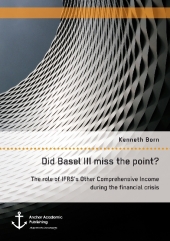 Neuerscheinungen 2017Stand: 2020-02-01 |
Schnellsuche
ISBN/Stichwort/Autor
|
Herderstraße 10
10625 Berlin
Tel.: 030 315 714 16
Fax 030 315 714 14
info@buchspektrum.de |

Kenneth Born
Did Basel III miss the point? The role of IFRS´s Other Comprehensive Income during the financial crisis
2017. 56 S. 13 Abb. 220 mm
Verlag/Jahr: ANCHOR ACADEMIC PUBLISHING 2017
ISBN: 3-9606710-5-9 (3960671059)
Neue ISBN: 978-3-9606710-5-3 (9783960671053)
Preis und Lieferzeit: Bitte klicken
The broad consensus before the recent financial crisis was that the so called fair value accounting (FVA) improves transparency contrary to the historical cost model. Since 2008, the discussion has been on the root cause of the crisis, which lessons can be gleaned from it and how making the same mistakes again can be avoided. Basel III was implemented in order to improve the regulatory environment and was the response of regulators and politicians to public pressure and suspicions raised by the bail out programmes for banks. Consequently, an until then inconceivable number of new regulations and regulatory bodies were introduced.
FVA was also blamed as part of the cause of the recent financial crisis. Available-for Sales (AfS) securities represent a major component of bank balance sheet asset. Gains and losses of AfS-positions are recorded within the Other Comprehensive Income (OCI). The OCI includes items which are not recognized (IAS 1.7) in income statements but increase or decrease a bank´s equity. The items also include income and expenses from Available-for-Sale positions (AfS) in accordance with IAS 39.
On October 13th, 2008, an amendment to IAS 39 was published by IASB. This amendment did authorize the reclassification of assets. This amendment clearly demonstrates the influence of FVA on the value of assets of banks that apply IFRS. The main objective of this book is to verify the influence of OCI and whether the new regulations sufficiently capture this critical factor.
Regulators should ensure that unrealized profits do not result in a capital drain. One way to assure this is to make OCI subject to a prudential filter and to deduct it from regulatory capital, which was the case until CRR became effective on January 1st, 2014 (CEBS guideline 2004). Basel III is even less strict than Basel II in that regard. Article 26(1) CRR clearly states that CET1 items must be recognized only in case they are really available to the financial institution for "unrestricted and immediate use to cover risks or losses as soon as these occur". Nevertheless, with the introduction of the CRR, the prudential filter for positions that caused the financial crisis and led to poor capitalization of banks was not strengthened but actually removed. At present, CRR does not envisage any filter for unrealized gains parked in OCI.
The author has many years of professional experience in the banking industry. Currently, he works as a Chief Risk Officer at an international bank. Before his current position, he held various management positions and also served as a bank supervisor for three years. He obtained his Master s degree from Vienna University of Economics and Business and holds several other economic degrees.
The author never stopped thinking outside the box. In particular during his professional occupation as a bank supervisor he started to question whether Basel III can reach its goal or whether it missed the point by mainly putting pressure on small banks with conservative business models which had nothing to do with the root cause of the financial crisis - while softening the regulations for large significant banking groups with heavy trading book exposures. With this book, the author wants to spark the discussion whether this approach can improve the situation of the financial industry.


